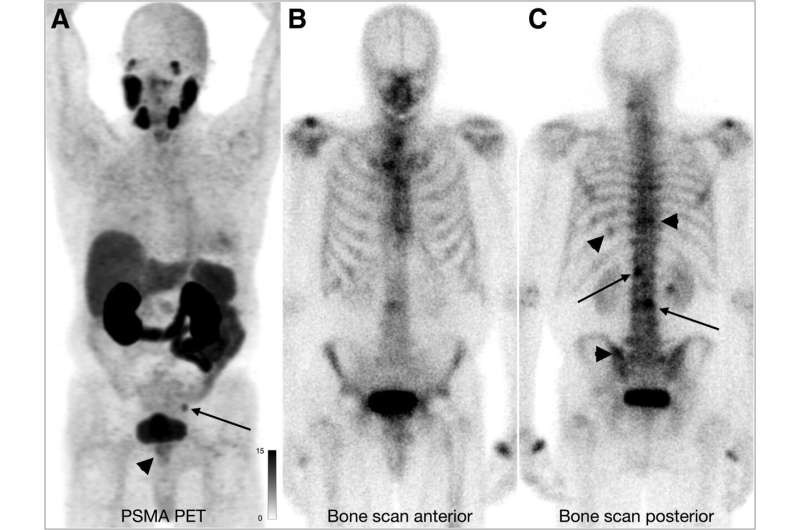This article has been reviewed according to Science X's editorial process and policies. Editors have highlighted the following attributes while ensuring the content's credibility:
fact-checked
peer-reviewed publication
trusted source
proofread
Bone scans overstage prostate cancer at initial staging compared with PSMA PET: Study

Bone scans have been found to overstage prostate cancer at initial staging compared to prostate-specific membrane antigen (PSMA) PET, according to new research published in the November issue of the Journal of Nuclear Medicine. The significant false-positive rate of metastases on bone scans means that definitive therapy for local disease may have been withheld from patients inappropriately.
PSMA PET is more accurate than CT and bone scans for staging patients with prostate cancer and, in recent years, has become the standard imaging modality at initial staging. Nearly all prostate cancer trials have used CT and bone scans for staging, however, and the best way to apply those data to patients staged with PSMA PET remains unclear.
"Most research to date has focused on the increased sensitivity of PSMA PET versus conventional imaging such as bone scans and CT," said Thomas Hope, MD, vice chair of clinical operations and strategy in the Department of Radiology and Director of Molecular Therapy at the University of California in San Francisco. "In this study, my colleagues and I took the opposite approach and looked at where PSMA PET was negative when bone scans were positive."
The multicenter retrospective diagnostic study included 167 prostate cancer patients in various disease states who were imaged with bone scans and PSMA PET within 100 days. Three blinded readers interpreted each study. Using PSMA PET scans as the reference standard, researchers evaluated positive predictive value, negative predictive value, and specificity for bone scans as well as inter-reader reproducibility, positivity rate, uptake on PSMA PET, and number of lesions.
While the specificity of bone scans was found to be high and similar across disease states, the positive predictive value of bone scans at initial staging was found to be much lower than in the overall population. Compared to PSMA PET, more than half (57 percent) of bone scans at initial staging were found to contain false-positive metastases.
"Rather than receiving definitive radiation treatment for localized disease, these patients may have received treatment aimed at preventing the further spread of what was incorrectly identified as metastatic disease," said Hope "These results bring into question how to apply data from clinical trials that are based on bone scans to patients who receive PSMA PET. Looking at the big picture, this study highlights the importance of understanding how test characteristics impact patient management."
More information: Thomas A. Hope et al, Do Bone Scans Overstage Disease Compared with PSMA PET at Initial Staging? An International Multicenter Retrospective Study with Masked Independent Readers, Journal of Nuclear Medicine (2023). DOI: 10.2967/jnumed.123.265916



















